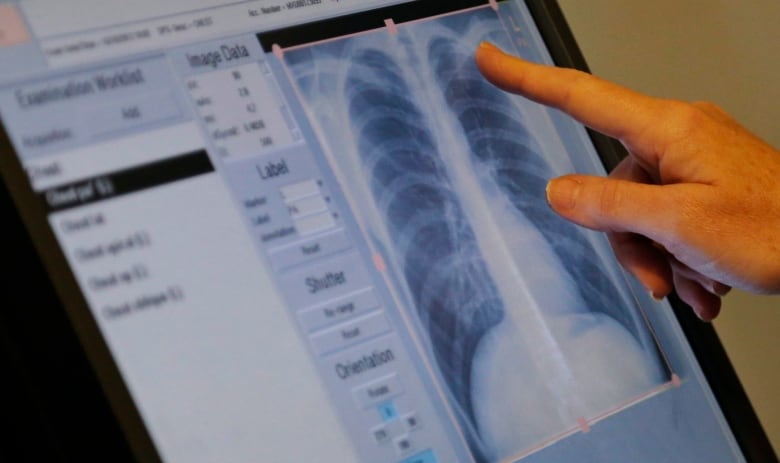14 tuberculosis cases in Nain a 'significant concern' in wake of death
High concentration of infected people unusual for Newfoundland and Labrador

A recent spike in tuberculosis in the northern Labrador town of Nain, including one recent death, is emerging as a concern for health authorities.
Since October, there have been 14 confirmed cases of TB in Nain, with a total of 16 reported in the Labrador-Grenfell Health region.
"For one community, that's quite a high number," said Dr. David Allison, chief medical officer of health for Eastern Health.

Tuberculosis is an infectious disease that enters the body through the lungs but can spread to other organs of the body. Once active and if left untreated, it can kill more than 50 per cent of those infected.
A 39-year old Nain man, Gordon Obed, died in April after months of suffering from an undiagnosed case of TB.
David Allison told CBC's Labrador Morning that having 14 cases in one community is alarming because over the course of a year there are typically just seven to 12 cases in all of Newfoundland and Labrador.
He added that the cases that typically present during the year are usually unrelated and isolated incidents.
Allison said with 14 cases coming from one small community, it's likely the outbreak is a result of sufferers coming in contact with one another.
He also said that the cases in Nain are worrisome because most of them are young people, and TB reactivation is typically more prevalent in the elderly.
"This is a relatively young population," he said.
"I think most of the individuals in this present outbreak are between 20 and 40 or so."
Concentration of infected people elevates future risk
Allison said having that many people from one community carrying the infection is troubling, as even when people have overcome the disease or measures have been put in place to combat it, the infection can lay dormant in people's bodies for years.

"Because there's a number of people in the community who harbour the bacteria, there's a chance that those individuals can reactivate and cause infection down the road," he said.
"It's the concentration in the number of people more than a breakdown in some sort of process."
That risk of reinfection has led health authorities to cast their net wide, and to test people who they believe may have come in contact with people with TB.
"In this particular situation, we have 14 cases, but we've followed up about 300 contacts," he said.
"We have to be very vigilant about this disease, we can't simply test for it and say there is no sign, we can't close the book. We may well have to follow up contacts on an annual basis in the future to make sure people aren't developing the disease."
Nain man recently lost his son to TB
Meanwhile, the death of Gordon Obed Jr. has provided a startling example of what can happen if a case of tuberculosis goes undiagnosed.

Obed died in St. John's after being sick for several weeks. Nobody knew at the time what was wrong with him, and only when his father recently visited the doctor in Happy Valley-Goose Bay to get some routine X-rays done did he finally find out what took his son's life.
"While I was there, we got to talking with the doctor and he asked me if that was our son who passed away coming through Goose Bay, and coming through St. John's," Gordon Obed Sr. told Labrador Morning.
The doctor then asked him if he knew his son had TB, which Obed said he did not.
"He eventually wanted to look in his computer to see if he had a file on him, on our son," Obed said. "He was kind of surprised to see that his autopsy report was in his computer, among other things. The autopsy report said the main cause was he had TB in his stomach."
Obed said the doctor began asking him if there was a history of TB in his family — which Obed said there was.
"My mom had TB when I was born so I got sent home and my mom stayed in St. Anthony for one year because she had TB," he said. "On my wife's side, my wife's dad, my wife's grandfather and my wife's uncle — who passed away in 1954 due to TB."
Obed still has a lot of unanswered questions about his son's death, such as why they were not able to diagnose him properly.
"They couldn't figure out what was wrong with him," he said. "I suppose I have a pretty good idea of what TB in the lungs is, but this is very different for me."
AngajukKAK cites lack of communication
Joe Dicker, the AngajukKaK for Nain, said Wednesday he is only just learning about the recent outbreak in the town — something that he says sheds light on a serious communication problem.
"There's no communication with the community members with Labrador-Grenfell Health or whoever the people who are handling the situation, with how to take preventative measures as to how to prevent this virus," Dicker told CBC's Crosstalk.
"Labrador-Grenfell Health doesn't disclose this information, I guess they consider that to be confidential."
Dicker would like to see greater collaboration between health officals and the town, so that everyone can be doing whatever they can to contain the outbreak and prevent others from getting sick or worse.
"If they are considering it to be an outbreak, we as a community should be made aware so we can protect ourselves," he said.
"I would like to know if our community is safe, if the TB virus is contained."